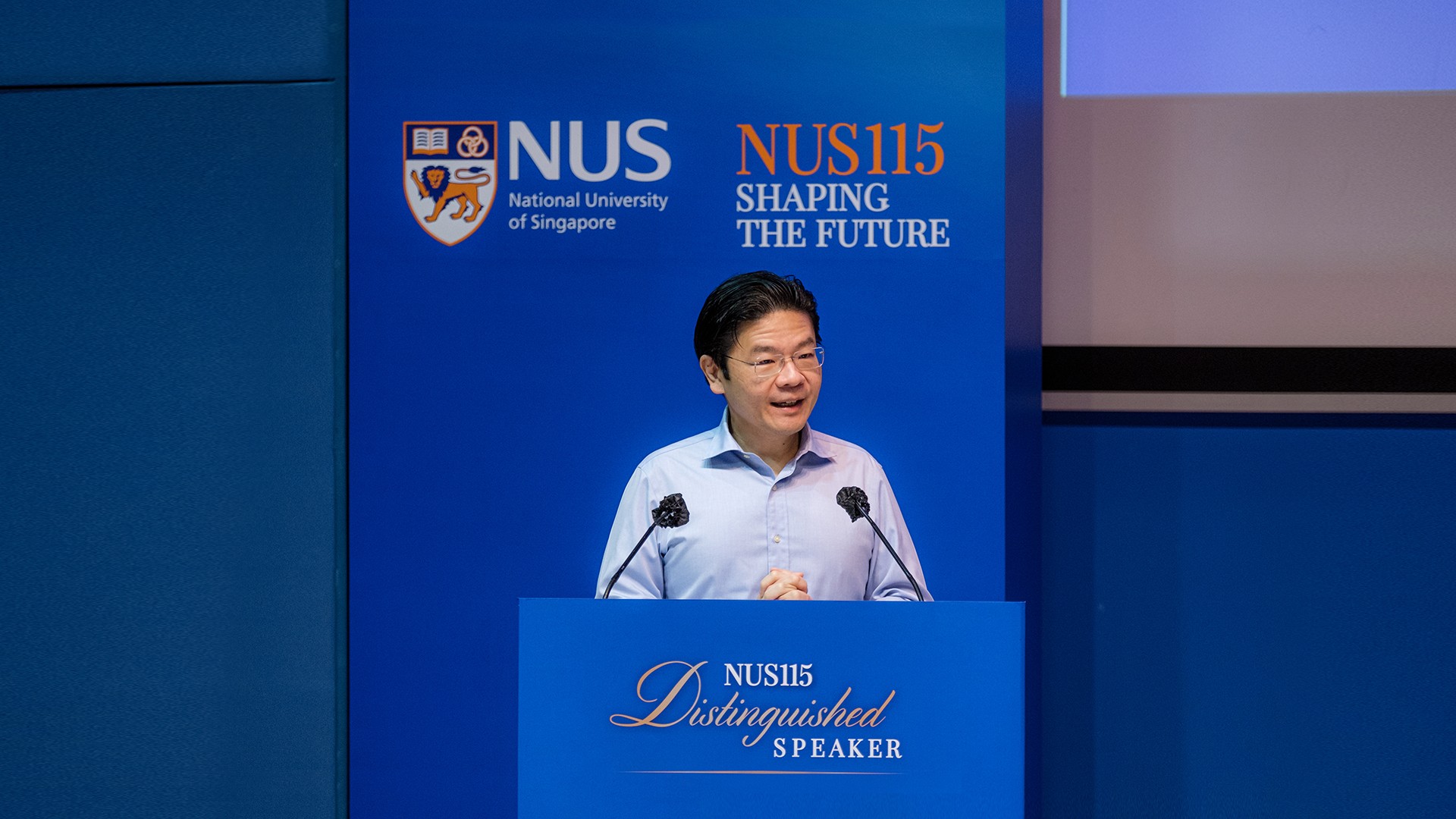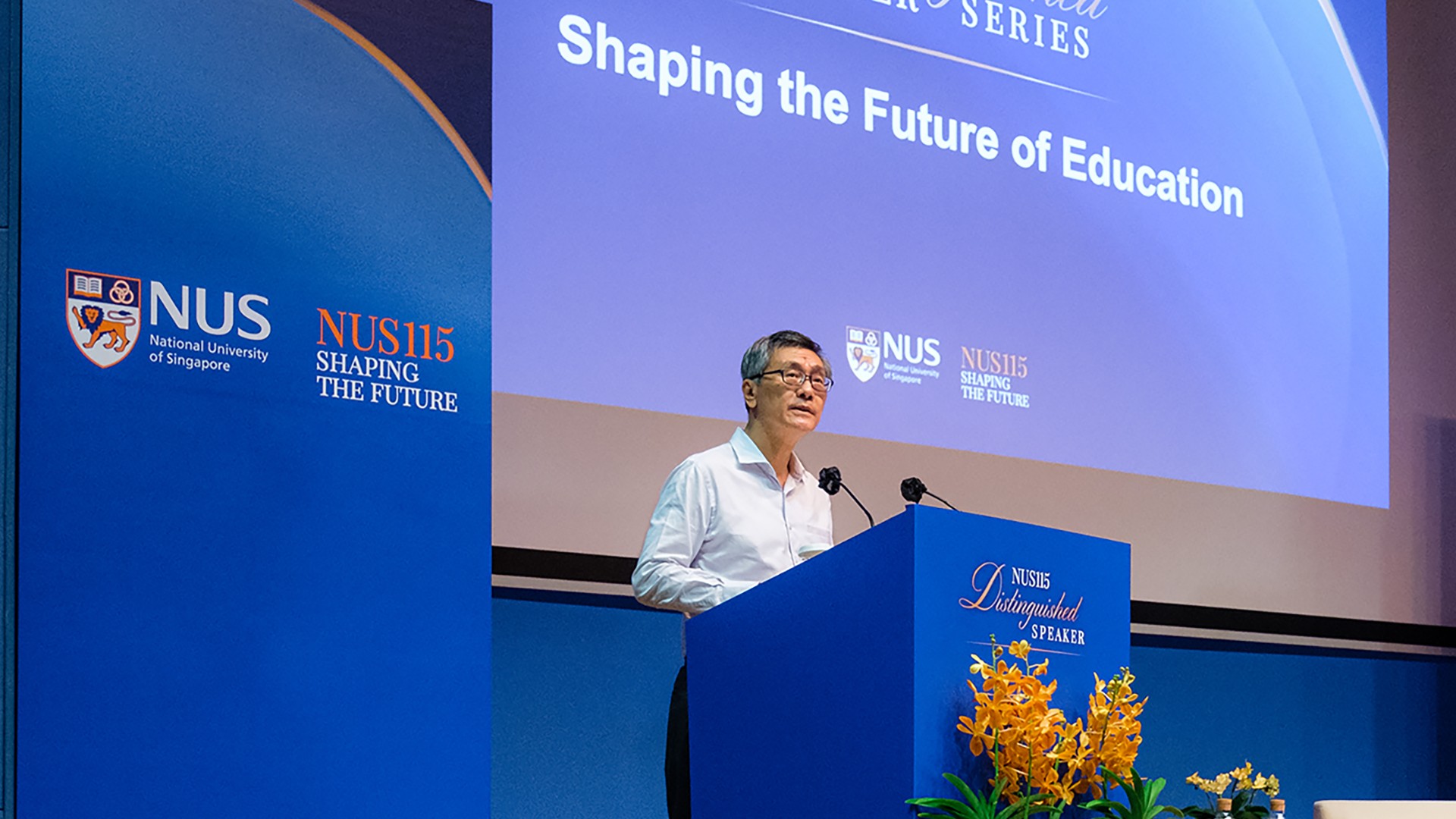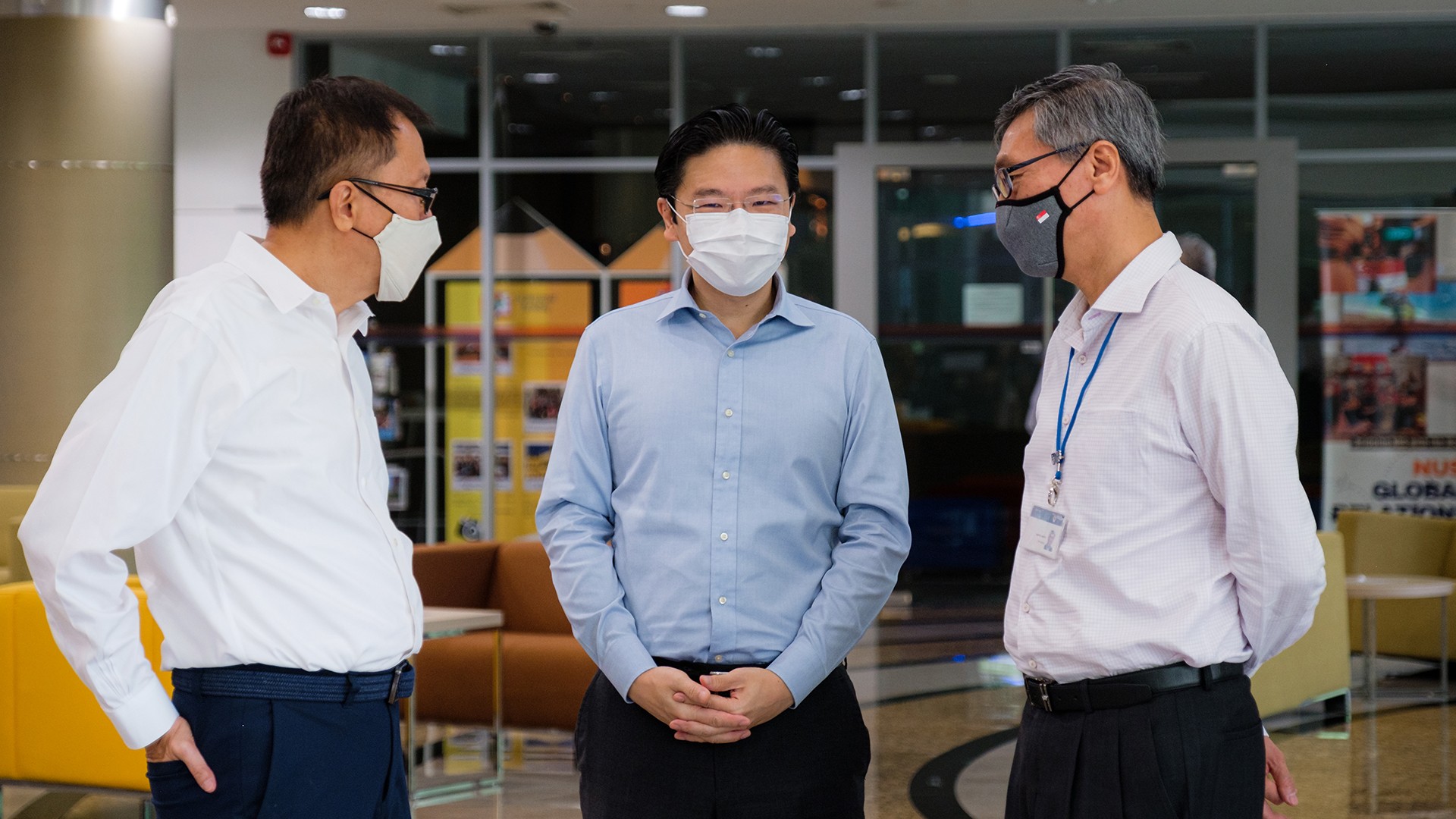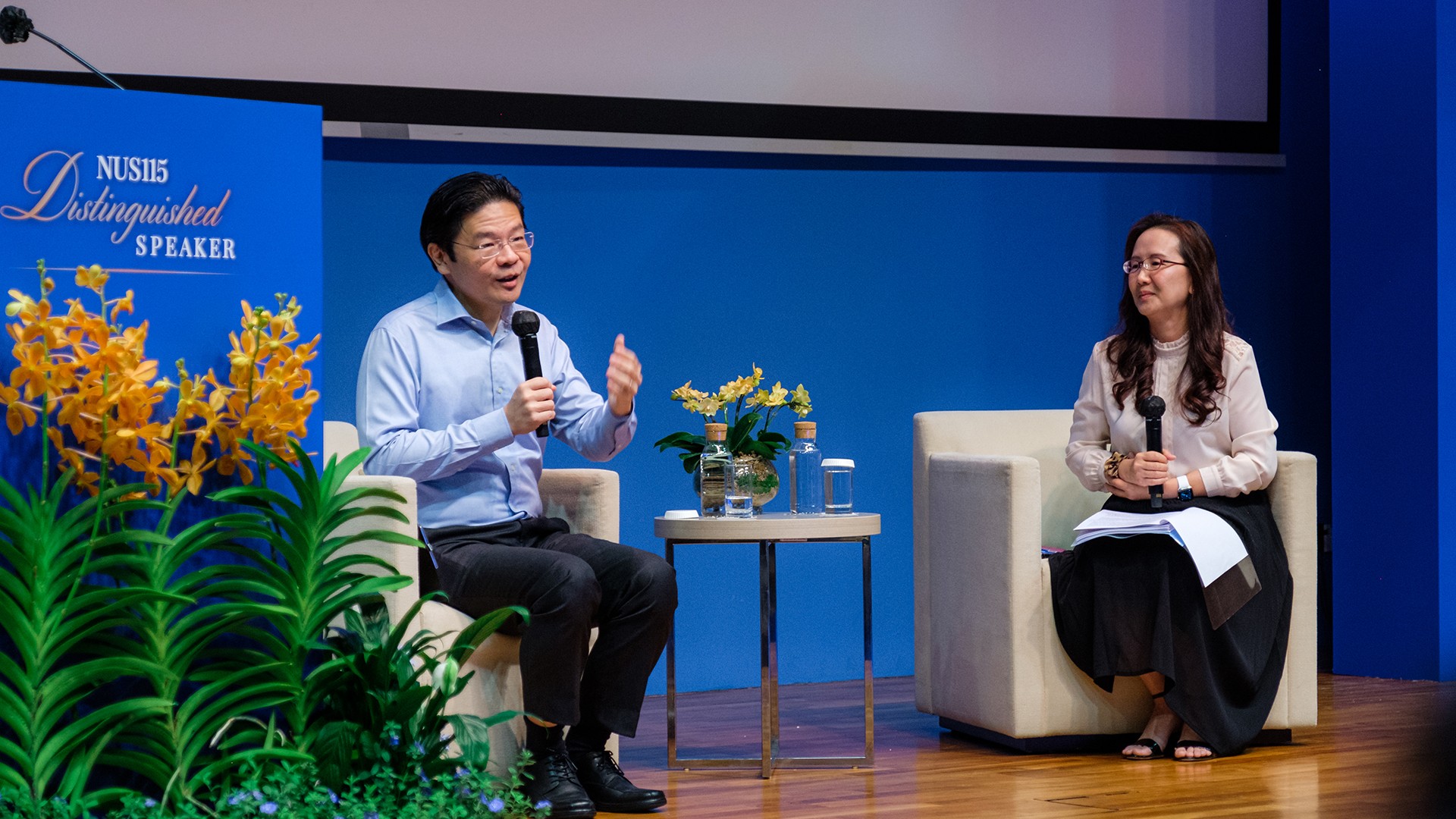Education Minister Lawrence Wong lays out four strategies to prepare students for the future
December 4, 2020

Maximising opportunities for disadvantaged students, allowing multiple educational pathways for students, developing soft skills beyond book knowledge, and promoting interdisciplinary learning – these will be the four major thrusts for Singapore’s education system, according to Education Minister Mr Lawrence Wong.
These will be supplemented by encouraging all Singaporeans – not just those still in school – to embrace a spirit of lifelong learning, added Mr Wong, who was speaking on 3 Dec at the inaugural session of the NUS115 Distinguished Speaker Series.
Such major changes are needed due to the unpredictable geopolitical situation worldwide and the relentless advance of the digital age.
“It will be a bumpy journey ahead with major disruptions to businesses and workers everywhere,” said Mr Wong.
What does this mean for the future of education?
There is no single way or formula for preparing the country’s young people for the new and more complex future, stressed Mr Wong, who had taken on the Education portfolio in July. But he intends to build on what his predecessors have achieved while seeking further improvements in the system.
Helping underprivileged students
The first strategy is to maximise opportunities for students from disadvantaged backgrounds, and ensure that education remains an uplifting force for society.
The government will continue to invest significantly in pre-school affordability, accessibility and quality. It will strengthen its focus on students who do not do so well in school, or who come from more challenging backgrounds.
“One emerging area of focus is mental health,” said Mr Wong. “Working with our schools and Institutes of Higher Learning, we want to do more to destigmatise mental health issues, strengthen peer support, recruit more full-time counsellors and have more educators trained as para-counsellors to provide all the support we can for students who need help.”
Offering students multiple pathways to excel
Recognising that every child is unique, the Education Ministry will continue to allow multiple pathways for each of them to thrive.
Mr Wong noted that important roles played by different parts of the educational ecosystem – comprehensive universities like NUS, as well as more focused universities and applied universities. Singapore also has specialised institutions such as arts schools, and skills and vocational pathways anchored by Polytechnics and Institutes of Technical Education. “This diversity is a major strength, which we must continue to uphold.”
Attitudes and skills beyond the classroom
The third thrust involves developing soft skills and the correct attitude in students to allow them to thrive. This includes the ability to build relationships with one another, to collaborate and work in teams, to be able to think creatively, and to keep on learning spontaneously. “These soft skills may sound like the most natural things in the world and everyone can do that, but in fact, they ought to be practiced continuously,” said Mr Wong.
The Ministry will therefore be implementing a new character and citizenship curriculum starting next year to put greater emphasis on moral values and character, and spend more time on cyber-wellness and the discussion of contemporary issues: “Our students should feel a strong sense of duty and responsibility to their fellow citizens; and a readiness to serve and help others succeed.”
Interdisciplinary education
The fourth strategy involves promoting interdisciplinary learning to support career mobility and learning and cognitive agility, so that Singaporeans can be prepared for a more dynamic and uncertain future.
“We must nurture the ability to see the broader connection of things and to work seamlessly across different disciplines,” said Mr Wong. “We must prepare students to appreciate the realities of life, where many issues are complex and cross-cutting. Problems in the real-world cannot be solved by an engineer alone, or an architect or a scientist, or anyone from a single discipline — they really need different skillsets to come together.”
Yet, subject specialisation is also important, and Mr Wong cautioned against swinging from one extreme to the other. “The explosion of knowledge, particularly in the digital age, makes it impossible for any single person to keep up with what is happening in even a few disciplines… We should encourage students with the aptitude and passion to go as far as they can, and excel in their chosen fields.”

NUS is leading the way in this respect.
In his welcome remarks, NUS President Professor Tan Eng Chye said that the University will continue to push the boundaries of disciplines, and take the lead in spearheading integrative, interdisciplinary education.
“Through interdisciplinary education, students will learn to harness and integrate knowledge, insights, skills and experiences across disciplines and environments. This expands the range of possibilities for perspectives and contributions that can come together; our students will then be able to shape richer, better and more informed solutions to complex problems,” said Prof Tan.
The University’s efforts to take the lead – not just in interdisciplinary learning, but in all aspects of research and education – were applauded by the Minister.
“NUS can lead the way in this journey of transformation. You are already doing so and you can continue being the leader. You may be our oldest university, but you are not old in your mindset and thinking; you continue to have a start-up mindset.”

A spirit of lifelong learning
While Institutes of Higher Learning and schools will play a major role, individual Singaporeans “must embrace lifelong learning as a personal habit and an integral way of life”, said Mr Wong. “Graduates will have to learn new things multiple times in their working lives.”
He cited the positive example of Mr Eric Liu, who is in his late 30s and graduated from NUS with Honours (Highest Distinction) last year with a degree in electronics engineering.
Mr Liu had started his career as a production technician. To upgrade himself, he enrolled in a part-time diploma programme from Ngee Ann Polytechnic, before pursuing a part-time degree at NUS. With his new skills, he continued to progress in his career, and has just started a new job as a digital hardware engineer in ST Engineering.
NUS115 Distinguished Speaker Series
Mr Wong was the inaugural speaker at the NUS115 Distinguished Speaker Series, which commemorates 115 years since the University was founded in 1905.
The series was supposed to have commenced in the early part of the year, but COVID-19 had thrown a spanner in the works. Nonetheless, the series could take off just in time in the final month of 2020, thanks to the stellar leadership, gumption and resolve of Singapore’s Multi-Ministry Taskforce on COVID-19 which has brought the local situation under good control, noted Prof Tan.

Lively question-and-answer session
Mr Wong also fielded questions from NUS students, staff and alumni in a lively question-and-answer session, moderated by Professor Susanna Leong, Vice Provost (Masters' Programmes & Lifelong Education) and Dean of the School of Continuing & Lifelong Education.
In response to a question on how institutions can help their students to adapt and contribute to Singapore during these unprecedented times, Mr Wong noted that Singapore’s universities are already doing a lot.
There are many graduates who are concerned about finding jobs during this period, and universities have scaled up support for students in programmes such as job matching and career counselling. The government has also stepped up with traineeship schemes. “We would like (students) to get a full-time job of course, but in a crisis like this, if indeed full-time jobs are not available, then there are funded traineeships for students.”
Mr Wong noted that this year’s employment outcomes for university graduates have been similar to pre-COVID times if traineeships are included. This is a “tremendous achievement” given the dire employment situation in other countries, he said.
Other than the immediate crisis, universities can also go beyond book knowledge and instil in students a spirit of curiosity and inquiry, as well as a spirit of excellence to continue learning through life, said Mr Wong.
This, together with the strategic thrusts of the Education Ministry, will enable young Singaporeans to thrive in the new world order.
View a recording of the session.
This story first appeared in NUSnews on 22 September 2020.

